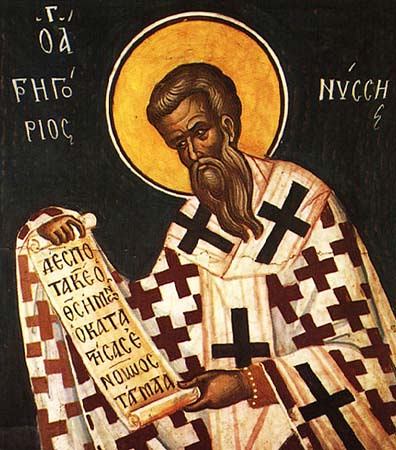Gregorio di Nissa frasi celebri
“Il cielo e non la terra è la patria dell'uomo.”
Origine: Citato in Ermes Ronchi, Il canto del pane, Edizioni San Paolo, Cinisello Balsamo, 2006, p. 24. ISBN 88-215-4709-4
“La parola di Dio, infatti, promette la vita proprio come effetto della morte.”
Omelie sull'Ecclesiaste
Origine: Citato in AA.VV., Il libro delle religioni, traduzione di Anna Carbone, Gribaudo, 2017, p. 217. ISBN 9788858015810
Gregorio di Nissa: Frasi in inglese
Commentary on the Song of Songs, As translated by Margaret M. Mitchell in Paul, the Corinthians and the Birth of Christian Hermeneutics (2010)
On Virginity, Chapter 18
The life of Moses; translation, introd. and notes by Abraham J. Malherbe and Everett Ferguson ; pref. by John Meyendorff Page 96 (1978 ed).
On Virginity, Chapter 18
Origine: Commentary on the Song of Songs, As translated by Richard A. Norris, Jr. (2012), p. 3
On Virginity, Chapter 11
“I got me slaves and slave-girls.”
For what price, tell me? What did you find in existence worth as much as this human nature? What price did you put on rationality? How many obols did you reckon the equivalent of the likeness of God? How many staters did you get for selling that being shaped by God? God said, Let us make man in our own image and likeness. If he is in the likeness of God, and rules the whole earth, and has been granted authority over everything on earth from God, who is his buyer, tell me? Who is his seller? To God alone belongs this power; or, rather, not even to God himself. For his gracious gifts, it says, are irrevocable. God would not therefore reduce the human race to slavery, since he himself, when we had been enslaved to sin, spontaneously recalled us to freedom. But if God does not enslave what is free, who is he that sets his own power above God's?
Homilies on Ecclesiastes; Hall and Moriarty, trs., de Gruyter (New York, 1993) p. 74 https://books.google.com/books?id=BReXJwwE_D8C&pg=PA74&lpg=PA74.
On Virginity, Chapter 11
On Virginity, Chapter 18
Commentary on the Song of Songs, As translated by Margaret M. Mitchell in Paul, the Corinthians and the Birth of Christian Hermeneutics (2010)
On Virginity, Chapter 11
Life of Macrina
On Virginity, Chapter 11
Homilies on Ecclesiastes; Hall and Moriarty, trs., de Gruyter (New York, 1993) p. 74 https://books.google.com/books?id=BReXJwwE_D8C&pg=PA74&lpg=PA74.
On Virginity, Chapter 24
On Virginity, Chapter 16
Dialogue on the Soul and the Resurrection, Patrologia Graeca 46.101-105
I take that to mean that any man who entrusts to language the task of presenting the ineffable Light is really and truly a liar; not because of any hatred on his part of the truth, but because of the feebleness of his instrument for expressing the thing thought of.
On Virginity, Chapter 10
On Virginity, Chapter 11
Commentary on the Song of Songs, As translated by Margaret M. Mitchell in Paul, the Corinthians and the Birth of Christian Hermeneutics (2010)
Commentary on the Song of Songs, As translated by Margaret M. Mitchell in Paul, the Corinthians and the Birth of Christian Hermeneutics (2010)
Homilies on the Beautitudes VI: 1, tr. S. Hall, in H. R. Drobner and A. Viciano (edd.), Gregory of Nyssa: Homilies on the Beatitudes: An English Version and Supporting Studies (Brill, Leiden, 2000).
On Infants' Early Deaths
A Treatise on 1 Corinthians 15.28 https://afkimel.wordpress.com/2019/10/04/in-illud-tunc-et-ipse-filius/
